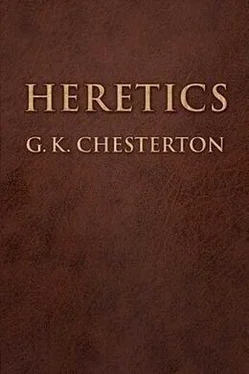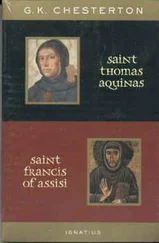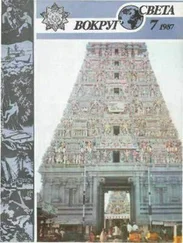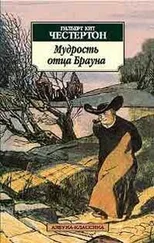The truth is that the scientific civilization in which Mr. McCabe believes has one rather particular defect; it is perpetually tending to destroy that democracy or power of the ordinary man in which Mr. McCabe also believes. Science means specialism, and specialism means oligarchy. If you once establish the habit of trusting particular men to produce particular results in physics or astronomy, you leave the door open for the equally natural demand that you should trust particular men to do particular things in government and the coercing of men. If, you feel it to be reasonable that one beetle should be the only study of one man, and that one man the only student of that one beetle, it is surely a very harmless consequence to go on to say that politics should be the only study of one man, and that one man the only student of politics. As I have pointed out elsewhere in this book, the expert is more aristocratic than the aristocrat, because the aristocrat is only the man who lives well, while the expert is the man who knows better. But if we look at the progress of our scientific civilization we see a gradual increase everywhere of the specialist over the popular function. Once men sang together round a table in chorus; now one man sings alone, for the absurd reason that he can sing better. If scientific civilization goes on (which is most improbable) only one man will laugh, because he can laugh better than the rest.
I do not know that I can express this more shortly than by taking as a text the single sentence of Mr. McCabe, which runs as follows: "The ballets of the Alhambra and the fireworks of the Crystal Palace and Mr. Chesterton's Daily News articles have their places in life." I wish that my articles had as noble a place as either of the other two things mentioned. But let us ask ourselves (in a spirit of love, as Mr. Chadband would say), what are the ballets of the Alhambra? The ballets of the Alhambra are institutions in which a particular selected row of persons in pink go through an operation known as dancing. Now, in all commonwealths dominated by a religion—in the Christian commonwealths of the Middle Ages and in many rude societies—this habit of dancing was a common habit with everybody, and was not necessarily confined to a professional class. A person could dance without being a dancer; a person could dance without being a specialist; a person could dance without being pink. And, in proportion as Mr. McCabe's scientific civilization advances—that is, in proportion as religious civilization (or real civilization) decays—the more and more "well trained," the more and more pink, become the people who do dance, and the more and more numerous become the people who don't. Mr. McCabe may recognize an example of what I mean in the gradual discrediting in society of the ancient European waltz or dance with partners, and the substitution of that horrible and degrading oriental interlude which is known as skirt–dancing. That is the whole essence of decadence, the effacement of five people who do a thing for fun by one person who does it for money. Now it follows, therefore, that when Mr. McCabe says that the ballets of the Alhambra and my articles "have their place in life," it ought to be pointed out to him that he is doing his best to create a world in which dancing, properly speaking, will have no place in life at all. He is, indeed, trying to create a world in which there will be no life for dancing to have a place in. The very fact that Mr. McCabe thinks of dancing as a thing belonging to some hired women at the Alhambra is an illustration of the same principle by which he is able to think of religion as a thing belonging to some hired men in white neckties. Both these things are things which should not be done for us, but by us. If Mr. McCabe were really religious he would be happy. If he were really happy he would dance.
Briefly, we may put the matter in this way. The main point of modern life is not that the Alhambra ballet has its place in life. The main point, the main enormous tragedy of modern life, is that Mr. McCabe has not his place in the Alhambra ballet. The joy of changing and graceful posture, the joy of suiting the swing of music to the swing of limbs, the joy of whirling drapery, the joy of standing on one leg,—all these should belong by rights to Mr. McCabe and to me; in short, to the ordinary healthy citizen. Probably we should not consent to go through these evolutions. But that is because we are miserable moderns and rationalists. We do not merely love ourselves more than we love duty; we actually love ourselves more than we love joy.
When, therefore, Mr. McCabe says that he gives the Alhambra dances (and my articles) their place in life, I think we are justified in pointing out that by the very nature of the case of his philosophy and of his favourite civilization he gives them a very inadequate place. For (if I may pursue the too flattering parallel) Mr. McCabe thinks of the Alhambra and of my articles as two very odd and absurd things, which some special people do (probably for money) in order to amuse him. But if he had ever felt himself the ancient, sublime, elemental, human instinct to dance, he would have discovered that dancing is not a frivolous thing at all, but a very serious thing. He would have discovered that it is the one grave and chaste and decent method of expressing a certain class of emotions. And similarly, if he had ever had, as Mr. Shaw and I have had, the impulse to what he calls paradox, he would have discovered that paradox again is not a frivolous thing, but a very serious thing. He would have found that paradox simply means a certain defiant joy which belongs to belief. I should regard any civilization which was without a universal habit of uproarious dancing as being, from the full human point of view, a defective civilization. And I should regard any mind which had not got the habit in one form or another of uproarious thinking as being, from the full human point of view, a defective mind. It is vain for Mr. McCabe to say that a ballet is a part of him. He should be part of a ballet, or else he is only part of a man. It is in vain for him to say that he is "not quarrelling with the importation of humour into the controversy." He ought himself to be importing humour into every controversy; for unless a man is in part a humorist, he is only in part a man. To sum up the whole matter very simply, if Mr. McCabe asks me why I import frivolity into a discussion of the nature of man, I answer, because frivolity is a part of the nature of man. If he asks me why I introduce what he calls paradoxes into a philosophical problem, I answer, because all philosophical problems tend to become paradoxical. If he objects to my treating of life riotously, I reply that life is a riot. And I say that the Universe as I see it, at any rate, is very much more like the fireworks at the Crystal Palace than it is like his own philosophy. About the whole cosmos there is a tense and secret festivity—like preparations for Guy Fawkes' day. Eternity is the eve of something. I never look up at the stars without feeling that they are the fires of a schoolboy's rocket, fixed in their everlasting fall.
XVII:
on the Wit of Whistler
That capable and ingenious writer, Mr. Arthur Symons, has included in a book of essays recently published, I believe, an apologia for "London Nights," in which he says that morality should be wholly subordinated to art in criticism, and he uses the somewhat singular argument that art or the worship of beauty is the same in all ages, while morality differs in every period and in every respect. He appears to defy his critics or his readers to mention any permanent feature or quality in ethics. This is surely a very curious example of that extravagant bias against morality which makes so many ultra–modern aesthetes as morbid and fanatical as any Eastern hermit. Unquestionably it is a very common phrase of modern intellectualism to say that the morality of one age can be entirely different to the morality of another. And like a great many other phrases of modern intellectualism, it means literally nothing at all. If the two moralities are entirely different, why do you call them both moralities? It is as if a man said, "Camels in various places are totally diverse; some have six legs, some have none, some have scales, some have feathers, some have horns, some have wings, some are green, some are triangular. There is no point which they have in common." The ordinary man of sense would reply, "Then what makes you call them all camels? What do you mean by a camel? How do you know a camel when you see one?" Of course, there is a permanent substance of morality, as much as there is a permanent substance of art; to say that is only to say that morality is morality, and that art is art. An ideal art critic would, no doubt, see the enduring beauty under every school; equally an ideal moralist would see the enduring ethic under every code. But practically some of the best Englishmen that ever lived could see nothing but filth and idolatry in the starry piety of the Brahmin. And it is equally true that practically the greatest group of artists that the world has ever seen, the giants of the Renaissance, could see nothing but barbarism in the ethereal energy of Gothic.
Читать дальше








